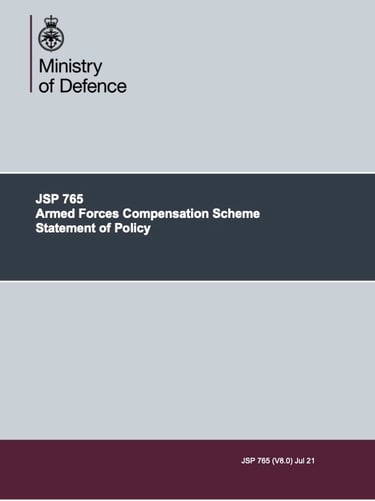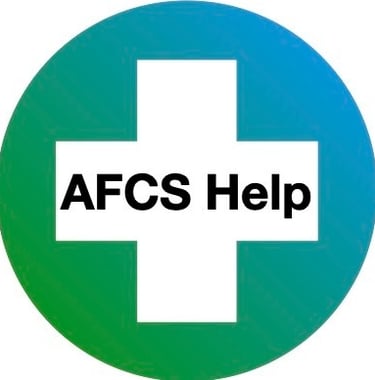
What is the Armed Forces Compensation Scheme ?
Note: This page does not contain any personal postal address or phone number.
Any such details shown in search engine results are outdated and incorrect.
What is AFCS? - Updated Content (No Personal Contact Details)
The Armed Forces Compensation Scheme or AFCS
The Armed Forces Compensation Scheme (AFCS) is designed to give compensation for injury or illness caused or made worse by service in the UK Armed Forces. It also covers cases where death is caused by service in the UK Armed Forces.
Injuries or death before 6 April 2005 come under the War Pension Scheme (WPS - please see below).
No fault
The AFCS is supposed to be a 'no fault' scheme, and is therefore supposed to be different from awards for damages paid through the courts following a successful civil claim for negligence. It may help to have a brief explanation of negligence for comparison:




Negligence
Imagine you go to the hospital with a really bad tummy ache. You see a doctor, let’s call him Dr Nick (“hi everybody!”) who asks you some questions about what you’ve eaten, where the pain is, how you’re pooping. Dr Nick owes you a specific duty of care, which is the first test for negligence, and his actions are compared to a theoretical group of doctors with the same training and experience as Dr Nick.
Imagine Dr Nick concludes you have constipation and sends you home with some laxatives and pain killers, but doesn’t examine you. If the imaginary group of doctors like yours would have examined you and found that you probably had appendicitis, and they would have admitted you for keyhole surgery to check your appendix, then Dr Nick has probably breached his duty of care to you.
This does not mean that Dr Nick has been negligent. To be negligent, Dr Nick’s breach of duty must cause you to suffer harm. If your symptoms resolve and your appendix calms down naturally, Dr Nick has not caused you harm. If you walk from the examination into the hospital corridor, double over in pain, and are rushed to surgery where your appendix is removed, then Dr Nick did not cause you harm, as your appendix was going pop even if he’d rushed you straight to surgery.
If, however, you go home, take the laxatives and painkillers, but your tummy pain gets worse; you're taken back to hospital by ambulance, where you are rushed to surgery, and your appendix is found to have ruptured; the surgeon needs to do open surgery instead of keyhole, which leaves a scar, and the burst appendix causes sepsis, and so you have to stay in hospital for a few days on antibiotics; this is where Dr Nick has caused you harm. As an appropriately trained doctor, your ruptured appendix was foreseeable if he discharged you, and he may therefore have been negligent, and you can bring a claim against him for that negligence.
It’s worth noting that even in such situations, it’s not certain Dr Nick was negligent. His actions may have been reasonable, especially if he told you to keep an eye on your pain and come straight back to hospital if it got worse. If it was constipation, he saved you from unnecessary keyhole surgery because you'd been eating Biscuits Brown for a week.
Part of the intention in making the AFCS no fault is to avoid the legal complexity of a negligence claim, but still look after service personnel wounded while serving. That’s the aim, anyway.
Essentially negligence covers situations where someone is at fault for an injury. It is possible you may have grounds for a civil claim in negligence as well as your claim through the AFCS. If you are successful with both, though, you don’t get a higher level of compensation, as you can’t recover twice for the same injury, so the compensation would be merged.
Two key differences are that in negligence the losing side pays the winning side’s legal costs, and the case management and the decision in negligence are overseen by impartial judges. These are really important aspect in the AFCS, where you as a claimant are massively disadvantaged, which I’ll discuss elsewhere on the site.


Back to No Fault
I'd like to state clearly that I am not after a discussion of the extent of 'fault'. Some people may passionately feel that their injury was the fault of Tony Blair, the Tories, or General Melchett.
The AFCS is described as ‘no fault’ because the assessment of an injury, illness or death is supposed to be merely whether it was caused by service in the Armed Forces. There is no assessment of whether there was a duty of care, whether the injury was foreseeable, who may have caused the injury and in what circumstances. While there are some exceptions to whether an injury was due to service, they are generally sensible.
For example, getting appendicitis would not support a claim to the AFCS, as it’s something that’s caused by your own body.
If, however, you’re stuck at a remote outpost on exercise in Kenya, and CASEVAC is delayed because the aircrew had only just been served their amuse-bouche because of bad weather, and you get more ill, then your illness has been made worse by service. No one’s at fault, there’s no claim in negligence, but the AFCS would (should) pay you an award.




So far, so good.
Due to the no fault nature of the scheme, the Veterans UK case handlers and medical advisers are supposed to be able to:
assess your medical records,
confirm whether the injury you’re claiming for was caused or partly caused by service, and
then compare your injury to criteria listed in the legislation.
From those criteria your injury is given a level of seriousness, and that level is cross-referenced to amounts in a table which lists lump sums of compensation for each level.
Above a certain level of serious injury, you’re awarded what they call a GIP, a Guaranteed Income Payment, which is essentially an annual amount you’ll receive for life based on your pay when you left the service, or your current pay if you are still serving. Kind of like what you'd imagine a War Pension to be...




The AFCS and the WPS
In 2005 the Armed Forces Compensation Scheme replaced the War Pension Scheme. So that I’m not constantly writing ‘AFCS’, I will also refer to it as ‘the Scheme.’ When I do so I am referring to the AFCS not the WPS.
I would usually be suspicious that a newer scheme funded by the public purse is highly unlikely to be better for the recipient. While I don't know that much about the quite complicated WPS, despite trying to understand it, it does seem to have been improved by the AFCS, at least in policy terms, if not yet in terms of implementation and administration.
What wasn't improved was the name. I still generally say I have applied for a War Pension, as the word 'Compensation' suggests you're suing the MoD for your injury, and makes you feel like an ambulance chaser. I'm sure that wasn't coincidental.




What is the policy based on?
The policy behind the AFCS is written in JSP 765. The JSP is itself based on a statute, passed by Parliament, called The Armed Forces and Reserve Forces (Compensation Scheme) Order 2011 as amended, and this Order contains the rules of the Scheme.
Be aware when you apply to the Scheme that Veterans UK, who administer the WPS and AFCS, do not appear to know and understand the fine details of the JSP or the Order that well, at the very least in relation to the mental injury aspects. More about Veterans UK elsewhere on the site.
Although the JSP isn’t going to have you on the edge of your seat like an Andy McNab, Duncan Falconer or Geraint Jones novel, it is pretty well written and is quite good at explaining the important parts of the AFCS, without getting into the nitty gritty of the law that’s in the Order. The problem with the Order, in my humble opinion, is that it appears to try and provide for mental injuries in the Scheme by using the general provisions already written for physical injuries. I don’t think this quite works when you break it into its parts.
© 2025. All rights reserved.


